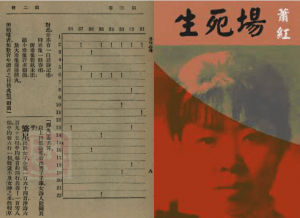PhD Candidate, East Asian Languages and Civilizations, University of Chicago
“Infrastructural fairy tales: State-led development and Tibetan transmedial interventions into China’s cultural heritage regime”
Time: Friday, April 1, 3-5pm CT
Zoom Registration Link: https://uchicago.zoom.us/meeting/register/tJEuf-qpqj0uEt3Rsjlh6f9UmM0Ei67bVlUX

On December 17, 2005, a herding family watches a television show in Shaqing Village, Sahuteng Town, Zaduo County, Qinghai Province. Image taken by Ren Xiaogang for a 2005 Xinhua news article on the success of the “Connect every village” infrastructure program in the pastoral regions of Qinghai.
Abstract: At the turn of the 21st century, large-scale development projects in China’s Western provinces channeled central state investments into environmental protection and the construction of transportation and communications infrastructure, leading to the displacement of millions of Tibetans and the proliferation of Chinese-language media in everyday life. The rhetoric of these policies asserts that financial investments into Western provinces would develop the region and its people economically, socially, and culturally. For Tibetans in the PRC, however, the development projects of the 2000s were experienced as an intensified process of national incorporation which sought to flatten and commodify Tibetan cultural heritage in the name of economic development. Therefore, these projects were met with renewed debates on cultural sovereignty and attempts to create alternative spaces for cultural production from below. This paper examines the contestations over cultural management in China’s state development policies through the transmedial interventions of the Third Generation of Tibetan poets and their Tibetan-language literature website Chömé. I argue that the growing access to digital media for Tibetans in the 2000s created opportunities within the decreasing space for Tibetan cultural sovereignty for Chömé to intervene as a transmedial literary archive and space for counterdevelopment.
Presenter: Susan Dan Su is a PhD Candidate in the Department of East Asian Literature and Civilizations at the University of Chicago. Her research centers on contemporary Tibetan literature and media with an emphasis on development studies, digital media, and cultural heritage in China. She is currently co-organizing the conference “Literary Transversals: Modern East Asian and Diasporic Literature” and hopes to see all of you there in late April!
Discussant: Heangjin Park is a Teaching Fellow in the Department of Anthropology and the College at the University of Chicago. Heangjin’s research concerns the global circulation of commodities and the reconfiguration of nationalist imaginaries across South Korea and China, focusing on the production and circulation of “Korean” kimchi in China. He is also participating in the project “Logistics in the Making of Mobile Worlds,” a multi-year collaborative research project funded by the Neubauer Collegium for Culture and Society.

